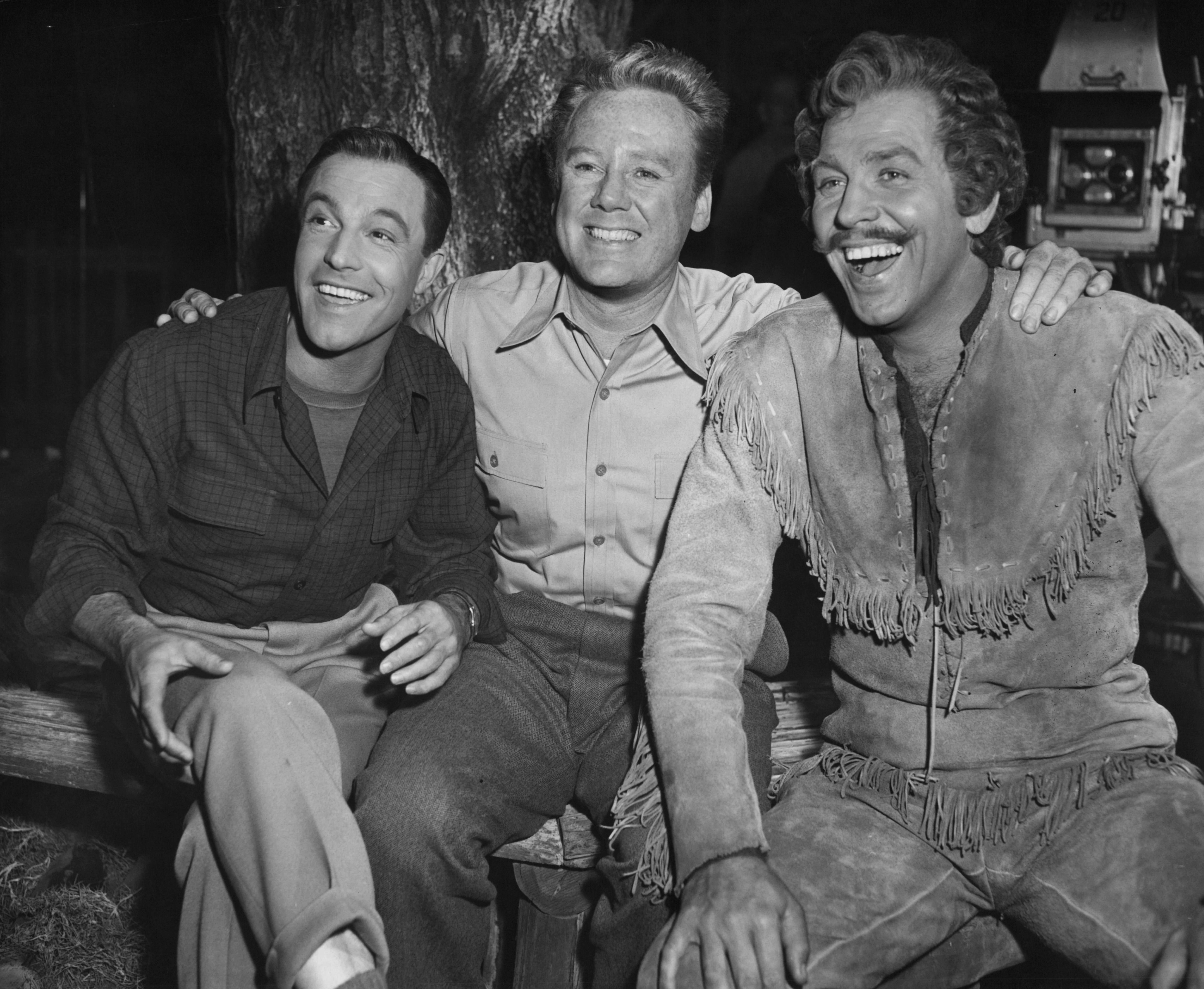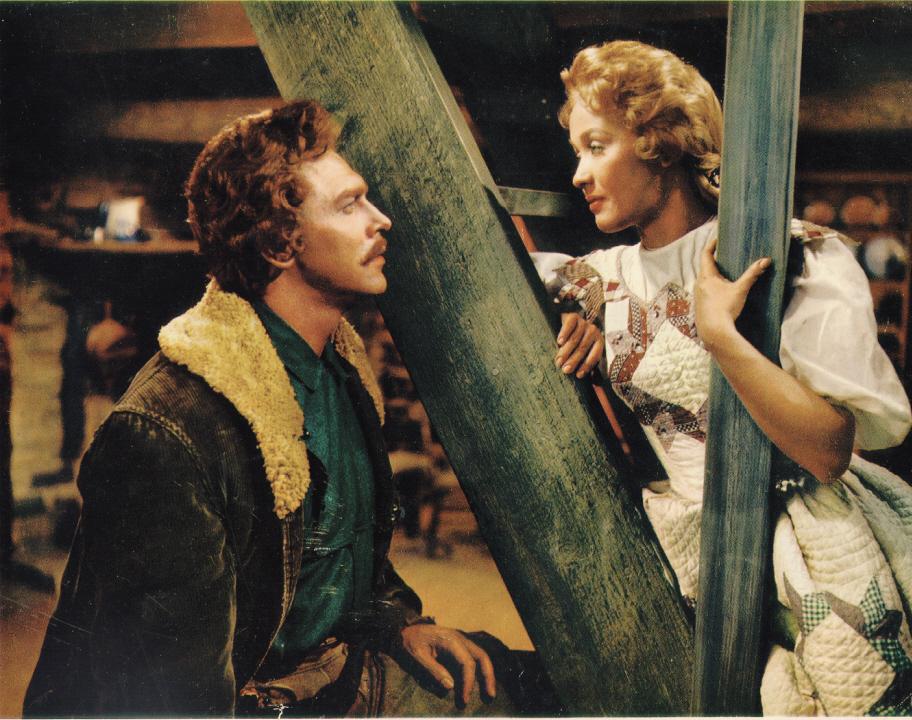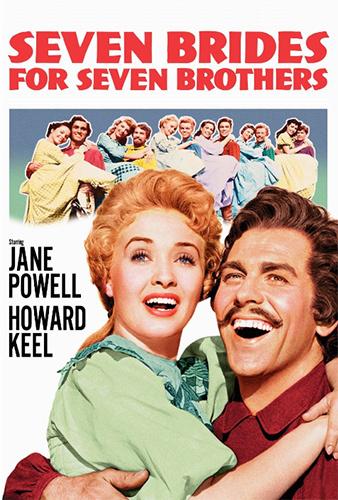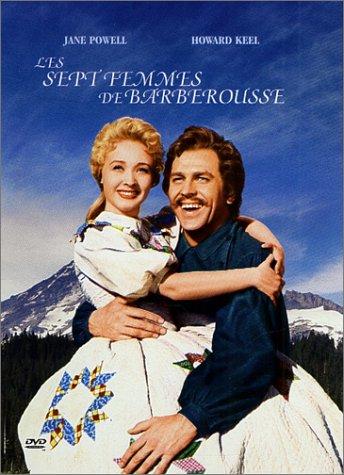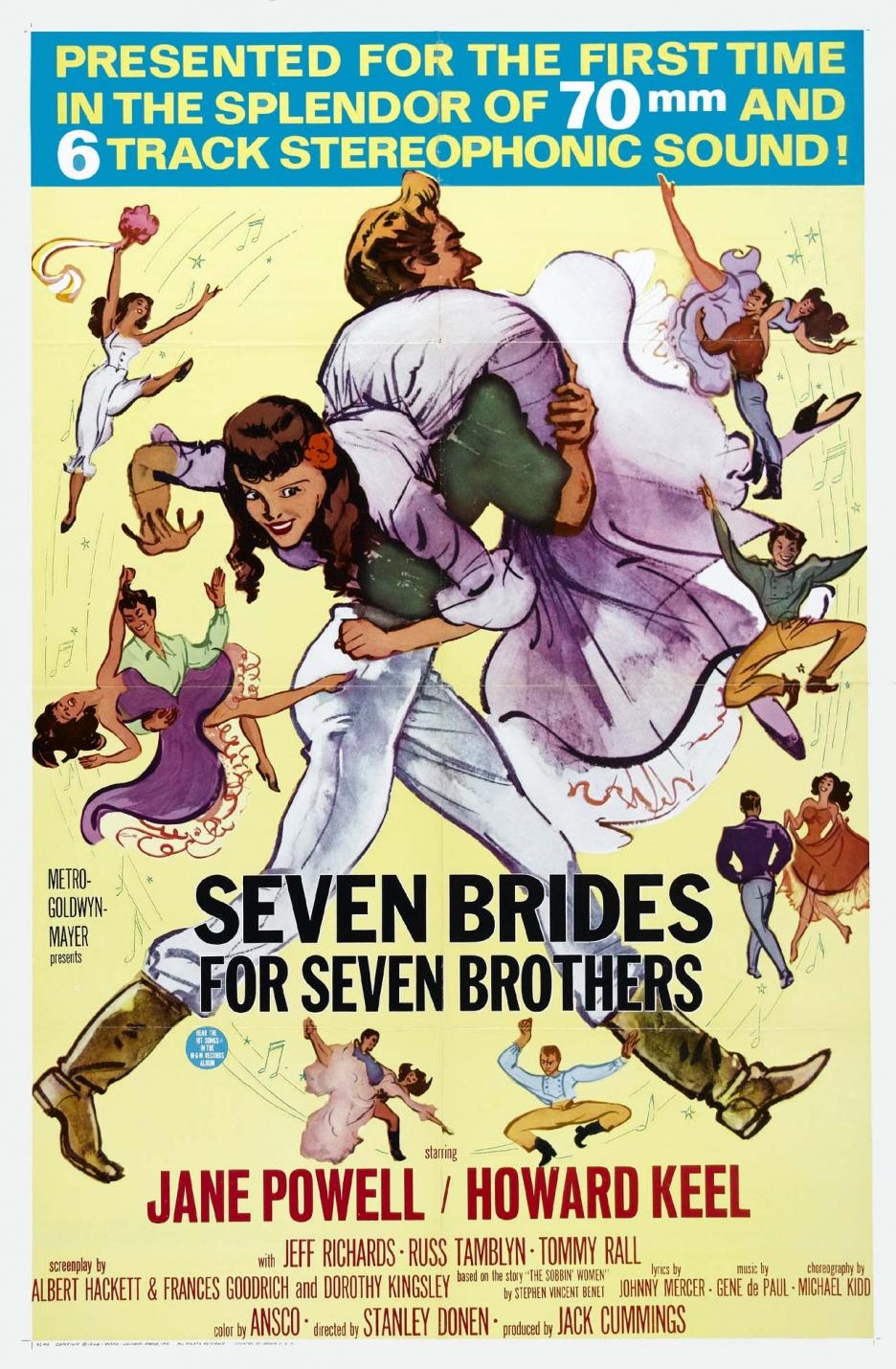Synopsis
In a quaint mountain town, the rugged Adam Pontipee embarks on a mission to procure not only the essentials of farming life—corn and equipment—but also a young, capable wife to manage the homestead. His heart isn't the focal point; rather, he desires someone to fulfill the dual roles of spouse and servant. Milly, the town's beloved cook, catches his eye. Despite a stream of marriage proposals from local men, Milly, known for her culinary charm, is intrigued by Adam and soon sets off with him to his remote family farm, sparking anxiety among the town's preacher and her concerned aunt.
Arriving at the Pontipee farm nestled in the mountains, Milly is met with a surprise: six unruly and unsophisticated brothers await. These lumberjacks are in dire need of proper manners, but with Milly's steadfast determination, they start to soften some of their rough edges. During a community barn-raising event, the brothers meet and inevitably fall head over heels for six local young women. A lively dance, complete with rhythmic camaraderie and rival confrontations, ensues, leaving the brothers lovesick and Milly empathetic yet worried. Seized by a dubious plan reminiscent of the Sabine women, Adam encourages his brothers to abduct their loves and bring them back to the Pontipee farm.
In the chaotic upheaval that follows, the brothers successfully whisk the young women away, inadvertently triggering an avalanche that seals them away for the winter. Furious and confined, the women, alongside an indignant Milly, take refuge in the farmhouse while banishing the Pontipees to the barn. As tension brews, Adam removes himself to a solitary cabin, oblivious to Milly's pregnancy, which promises a springtime arrival.
As the snow blankets the landscape, a gradual thaw emerges—not only in the environment but also in the hearts of the young captives and their captors. Bonds are mended over time, but the rift between Adam and Milly remains until the youngest brother, Gideon, pleads with Adam to return. The news of his newborn daughter eventually draws Adam back, heralding a reconciliation.
Spring blooms bring more than just a new season; they bring a revived love shared between the brothers and their sweethearts. However, the scene shifts as the townsmen rally to reclaim the women, unaware that the girls' allegiance has shifted. With an unexpected baby in the picture, an air of celebration descends upon the farm. Amidst joyful cheers and defiant declarations, romances culminate in a lively, unexpected wedding scene.
Argument
presents us with a seemingly light-hearted musical that belies deeper commentary on relationships and the transformation of rugged individualism into communal harmony. At its core, this film is an exploration of gender roles and the social comedy inherent in shifting expectations—a cinematic statement reflecting the complex intersection of personal desire and societal conventions.
The narrative begins with Adam Pontipee, a gruff pioneer who charges into a small mountain town. His rudimentary goals include obtaining supplies of corn and farming equipment but, most notably, finding a wife. Rather than seeking a partner for emotional companionship, Adam's quest is pragmatic, rooted in the expectation of finding a woman who is not just youthful and robust but also nurturing and skilled in domestic affairs. This search for an idealized "wife" underscores Adam's traditional views, where love is secondary to utility, highlighting the period's conventional dynamics.
Enter Milly, a young woman who is not only admired for her cooking acumen but is sought after by many a townsman for marriage. Yet, Milly's rejection of suitors hints at her preference for autonomy and her quiet resistance to simply becoming another man's helpmeet. However, her resolve seems to wane upon meeting Adam. She perceives a spark within him that overcomes the dubious nature of his intentions, leading her to abandon her place in town for life on the Pontipee farm—much to the consternation of the pastor and her aunt.
Milly's arrival at the farm unveils a truth more complex than she anticipated: Adam is not alone. He brings with him six unruly brothers, each a model of untamed and unsocialized masculinity. While their rough demeanor and lackadaisical understanding of courtship etiquette would deter many, Milly stands resilient. Her approach is exemplified by a robust and loving discipline—the means by which she reshapes the brothers' perspectives and conduct, fostering a semblance of civility and teaching them the nuances of respect.
The shift from chaos to order on the farm mirrors the broader social effort to align rusticity with refinement. Milly's influence extends beyond mere manners as the narrative showcases a seminal moment during a barn-raising event in town. Here, the brothers become smitten with six women, each charismatic and deeply ensconced within the community's social web. This is epitomized through an elaborate dance sequence—a metaphor for the dance of attraction and an implicit challenge to the suitors, who represent the entrenched local values.
However, romance in "Seven Brides for Seven Brothers" is far from conventional. The plot pivots dramatically when Adam concocts an audacious plan—rooted in mythic past and ethically ambiguous—to abduct the women, paralleling the Roman tale of the Sabine women. Adam's proposal speaks volumes about his character: impulsive, reckless, yet endearingly desperate for his brothers' happiness. The ensuing chaos not only traps the women at the farm due to an unforeseen snow-induced avalanche but also initiates a forced cohabitation that transforms both captors and captives over the isolation of winter.
Understandably, the women, led by Milly, are incensed, enacting a segregation of the sexes which sends the men to the barn's outlands. Adam's subsequent withdrawal to a hunting cabin is both a retreat and a reflection—emblematic of his struggle with personal growth and acceptance of responsibility. Milly exhibits remarkable resilience and agency during this period, revealing her pregnancy to the women, catalyzing a new, softer dynamic among them and the brothers. This development introduces a maternal motif, counterbalancing the film’s patriarchal gestures.
As winter thaws, the brothers’ crude personas are found to have softened under the current of burgeoning affection and social integration. Yet, it’s the return of Adam, spurred by the revelation of his daughter’s birth, that encapsulates the film’s redemptive themes. Adam's reconciliation with Milly signifies not just the mending of a personal rift but the broader reintegration of the family unit—a societal harmony derived from mutual understanding and shared responsibility.
With the arrival of spring, the entrenched social norms face their greatest test as the townsfolk, misled about the nature of their daughters' absence, converge on the farm for a final confrontation. The women’s autonomous declaration of ownership over Milly’s baby during a quasi-judicial inquiry staged by the pastor signals defiance against paternalistic presumption and champions the women's chosen bonds with their beaus.
The film culminates in joyous matrimony—a whirlwind of shotgun weddings amalgamating traditional symbols of union with the rebellious spirit of self-determined alliances. Through a mixture of humor and poignancy, "Seven Brides for Seven Brothers" argues for the progressive synthesis of individuality with community values, challenging both its characters and the audience to reconsider the essence of love, partnership, and familial cohesion amidst the American frontier’s rugged backdrop.
Cast

Jane Powell
Milly Pontipee

Howard Keel
Adam Pontipee

Jeff Richards
Benjamin Pontipee

Russ Tamblyn
Gideon Pontipee

Tommy Rall
Frank (Frankincense) Pontipee

Marc Platt
Daniel Pontipee

Matt Mattox
Caleb Pontipee

Jacques d'Amboise
Ephraim Pontipee

Julie Newmar
Dorcas Gaylen

Nancy Kilgas
Alice Elcott

Betty Carr
Sarah Kine

Virginia Gibson
Liza

Ruta Lee
Ruth Jepson

Norma Doggett
Martha

Ian Wolfe
Rev. Elcott

Howard Petrie
Pete Perkins

Earl Barton
Harry

Dante DiPaolo
Matt
Multimedia
